Camp Leopold Classes & Activities
Classes and activities for Camp Leopold are designed to cover a wide range of environmental topics highlighting the natural and man-made resources students and teachers will discover. Combining the observation techniques of Aldo Leopold with the rich flora and fauna of Camp Leopold provides a unique opportunity to enrich learning and spark a desire for students to discover the land and its inhabitants.Camp Leopold classes are divided into three separate emphasis areas to achieve these goals.
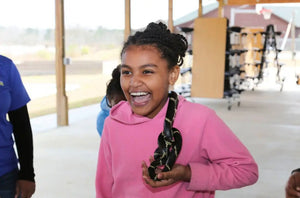
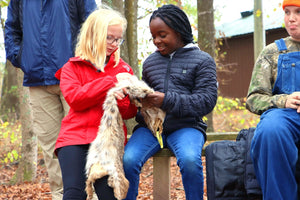
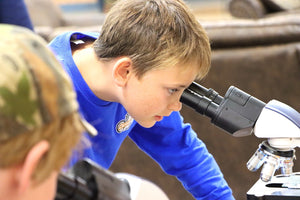
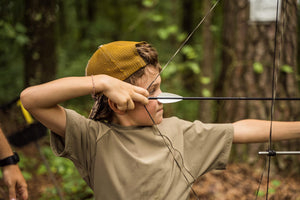
Archery
SC Standards: 4.P.3, 6.P.3
Develop coordination and spatial awareness while learning the physics behind tension, force, and trajectory in this fun, skill-based experience.
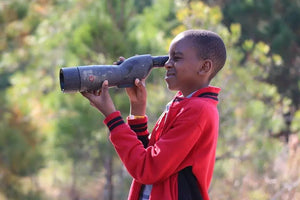
Birding 101
SC Standards: 4.L.5, 5.L.4
Students will take flight into the world of birdwatching, learning how to identify species by sight and sound. Using binoculars and their own keen eyes, they’ll observe bird behavior, habitats, and feeding patterns. Participants will collect and compare data with other groups, gaining a deeper understanding of bird diversity and the role these feathered friends play in the ecosystem.
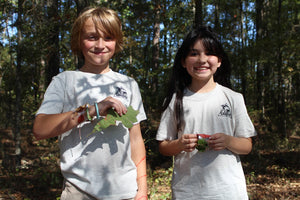
Carolina Canopy
SC Standards: 4.L.5, 5.L.4
Students will journey beneath the towering forest canopy to discover the vital role forests play for both wildlife and people. While hiking through the woods, they’ll learn how Camp Leopold manages its forests to provide habitat for countless species of plants and animals. Along the way, participants will practice tree identification and explore the connections between healthy forests and thriving ecosystems.
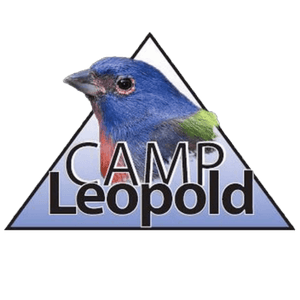
Campfire
SC Standards: SEL, 7.SPM.1
Enjoy stories, songs, and s’mores around a fire while reflecting on teamwork, wilderness skills, and shared learning experiences. Songs and silliness will bring smiles to everyone's faces for this special time as we sing and act out stories.

Creatures of the Woods
SC Standards: 4.L.5, 5.L.4
From the towering pines of the uplands, to the tranquil meadows, this course delves into the rich tapestry of habitats that support a variety of fascinating mammalian species. By examining the signs of animal presence in an area, students will not only learn to identify species but also gain insights into their behaviors, movements, and ecological roles. Through discussions and debates on mammalian diets, habits, and movement patterns, participants will deepen their appreciation for the complexity of wildlife ecosystems.
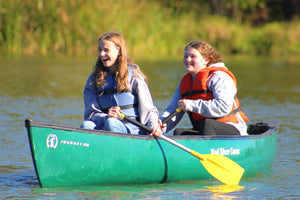
Canoe Adventure
SC Standards: 5.E.3, 6.E.2, PE standards
Explore the main camp waterfront while paddling in a canoe! Each group of
students within one canoe will have to work together to get to their final destination. Students will learn proper techniques of canoeing and observe nature within the pond at their own pace.

Dance Party
SC Standards: SEL and Health/PE integration
Celebrate the day’s accomplishments with music, movement, and community-building.

Game Night
SC Standards: 4.P.3, 5.P.2
Students will put their teamwork and strategy skills to the test in a variety of fun, interactive games. Through challenges that encourage problem-solving, cooperation, and critical thinking, participants will learn how to work
together, make quick decisions, and enjoy friendly competition. This evening activity is a great way to build confidence and camaraderie while having a blast!

Hidden Universe
SC Standards: 3.L.5, 5.L.4, 6.L.4
The students will become scientists! They will learn the different parts of a microscope and the many important uses. Using these microscopes, the students will get the opportunity to look at premade slides with a variety of specimens. Students will also be able to create their own slides and look
within “The Hidden Universe” reinforcing organism classification and environmental health.
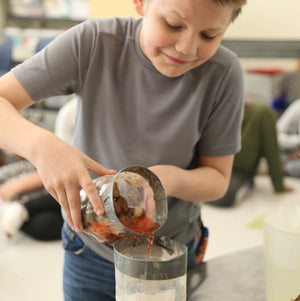
Human Impact
SC Standards: 5.E.3, 7.EC.5, 7.EC.6
Camp Leopold is an amazing place to learn how man can restore land to a place where wildlife thrives. Our camp has had a great deal of human impacts. Students will investigate their own lives and discover new
techniques to implement back home. During this discussion, students and instructors alike will discuss the main effects that humans have on the natural world, both positive and negative.
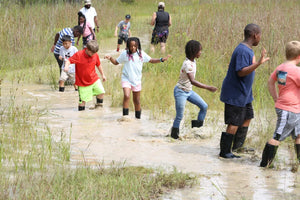
Invasion Investigation
SC Standards: 3.L.5, 5.L.4, 7.EC.5
Explore how invasive species compete with native plants and animals. Students investigate the effects of human introduction of non-native species and explore real-world conservation strategies. Discover research and the science and why and how these creatures got here. We will compare native plants to the non-native to see the impact they can have on the animals and plants.

Mammal Mania
SC Standards: 3.L.5, 4.L.5, 6.L.4
Join us on an exploration of the diverse native mammals that call South Carolina home. Examine fur, skulls, and tracks while learning about adaptations, classification, and biodiversity in mammal species native to South Carolina.

Marsh Madness
SC Standards: 5.L.4, 7.EC.5
Conduct hands-on studies in wetland environments to understand water
filtration, nutrient cycling, and the importance of wetlands to biodiversity.
Students exploring the wetlands areas of Camp Leopold will use new observation skills to start their journey as young naturalists recording their discoveries.

Movie Night
SC Standards: Literacy & Science Integration
Watch an environmental or conservation-themed film followed by group reflection on ecological or ethical issues.

Night Walk
SC Standards: 3.L.5, 4.L.5, 6.L.4
Take a guided hike to observe nocturnal and crepuscular animal behavior and sounds. Students explore how animals adapt to life in the dark. In this unique opportunity to see and hear some of the more elusive animals that call Camp Leopold home.
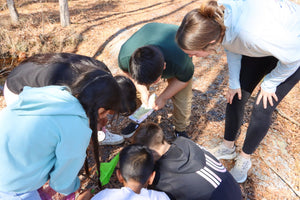
Off the Grid
SC Standards: 5.E.3, 6.E.2, 7.SPM.1
Learn survival skills through map reading, compass use, and landmark identification while exploring geography, Earth science, and spatial reasoning. Students build real-world survival skills by learning to read maps, navigate with a compass, and use natural landmarks. Along the way, they explore geography, Earth science, and spatial thinking in an outdoor setting.
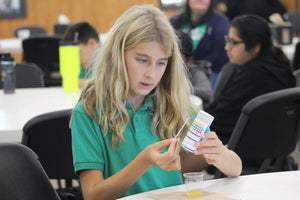
pH Prodigies
SC Standards: 5.P.2, 6.P.3
In this activity, students will be able to investigate the pH of the world around
them. Plants and animals heavily rely on certain pH levels needed to survive. The students will explore and discuss the differences in acidic and basic compounds around Camp Leopold. They will be able to do experiments of their own to identify the pH of different variables.

Pond Ecology
SC Standards: 5.L.4, 6.L.4, 7.EC.5
Explore freshwater ecosystems by collecting and observing aquatic organisms. Students analyze food webs and biodiversity in real-time. Students wade into the world of freshwater habitats, collecting and identifying aquatic plants and animals. Through hands-on observation, they uncover how food webs work and measure biodiversity, gaining a real-time understanding of ecosystem health.
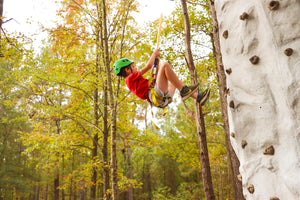
Rockin’ Heights
SC Standards: 4.P.3, 5.P.2 (physics principles like gravity, force, friction) Climb our wall to apply concepts of motion, force, and balance. This experience builds physical confidence while reinforcing simple machines and energy transfer. Our climbing wall challenges students to face their fear of heights. The three person feature lets students battle their peers in a speed race to the top. Like tree frogs, the students will test their grip strength in this activity, while improving their hand-eye coordination.
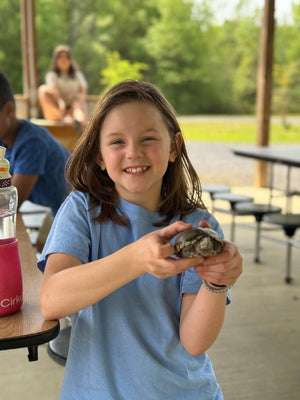
Scales & Tails
SC Standards: 3.L.5, 4.L.5, 6.L.4
Reptiles and amphibians play a crucial role in maintaining the delicate balance of their ecosystems. Students will have the opportunity to interact with our LIVE animal ambassadors. By understanding and celebrating these creatures, we are inspired to advocate for their conservation, recognizing the vital role they play in preserving biodiversity and ecological stability.

Sky Park
SC Standards: 4.P.3, 6.P.3
Explore physics concepts like gravity, force, and balance on our high ropes course while building confidence and resilience.
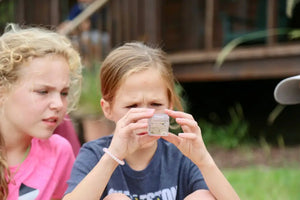
Spineless Wonders
SC Standards: 4.L.5, 5.L.4
Students will discover the strange and amazing “superpowers” of invertebrates—animals without backbones. From insects to crustaceans, they’ll explore the incredible diversity and unique adaptations that make these creatures vital to nearly every ecosystem. Through hands-on hunting, collecting, and recording, participants will investigate the spineless residents of Camp Leopold’s many habitats.

Star Gazers
SC Standards: 4.E.3, 6.E.2
Stargazing at the night sky at Camp Leopold will give everyone a sense of wonder and appreciation for the dark night sky without any distracting city lights. Students will identify stars, planets, and constellations while learning how ancient and modern people use celestial bodies for navigation.
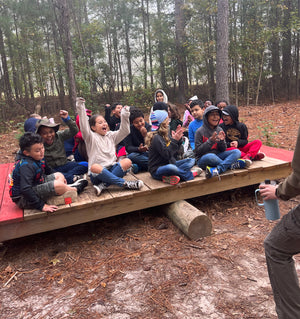
Stronger Together
SC Standards: SEL Competencies, 7.SPM.1
Through group challenges, students develop critical thinking and teamwork skills while applying scientific reasoning to solve real-world outdoor puzzles. Building group dynamics and teamwork to reach crazy new goals will be the focus of this activity.

Weather Wire
SC Standards: 4.E.1, 5.E.1
Students will explore the science of weather by observing patterns, measuring conditions, and learning how weather affects the environment. They’ll also get creative by making hands-on weather-themed crafts that reinforce their understanding of concepts like temperature, wind, precipitation, and clouds. This activity combines STEM learning with artistic expression for a fun, memorable experience.
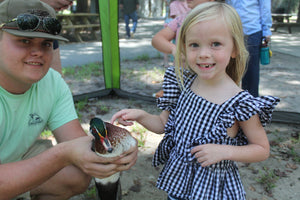
Wings Over Water
SC Standards: 3.L.5, 4.L.5, 6.L.4
Meet live ducks and study their physical and behavioral adaptations. Students explore the interconnectedness of species and habitats in wetlands. This exploration extends beyond mere observation; it serves as a platform for meaningful conservation dialogue. By studying the interplay between environmental factors and wildlife behaviors, students will gain a deeper appreciation for the delicate balance of ecosystems. Moreover, engaging with conservation experts and fellow peers in conversations about the importance of preserving waterfowl habitats will empower students to become advocates for environmental stewardship.
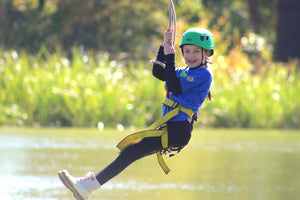
Zoomin' Zipline
SC Standards: 4.P.3, 5.P.2
This activity will test the students bravery as they leap off of Bravery Peak. The students will glide across water while enjoying a new view of camp. Participants are encouraged to step out of their comfort zone and experience the thrill of flight! The zipline is over 150 feet long. Our trained staff will teach participants zip-lining basics and will help develop their confidence as adventurers.

3D Archery Course
SC Standards: 4.P.3, 6.P.3
Advance from Archery 101 into a natural setting with life-sized animal targets—an immersive way to apply motion and energy concepts.


